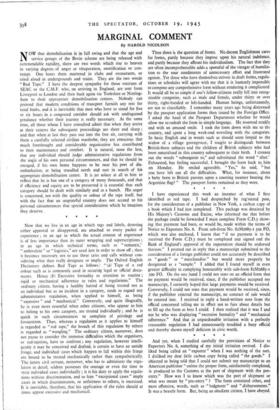Now that we live in an age in which tags
and labels, denoting either approval or disapproval, are attached to every - packet of experience ; in an age in which the actual content of experience is of less importance than its outer wrapping and superscriptions ; in an age in which technical terms, such as "semantic,' "ambivalent " or " logistics," are used just in order to show off ; then it becomes necessary not to use these cries and calls without con- sidering what they really designate or imply. The Oxford English Dictionary defines Red Tape as follows : "(a) Tape of a red colour such as is commonly used in securing legal or official docu- ments. Hence (b) Excessive formality or attention to routine ; rigid or mechanical adherence to rules and regulations." The ordinary citizen, having a healthy hatred of being treated not as an individual but as an incident in a category, tends to regascl any administrative regulation, when applied to himself, as being " excessive " and "mechanical." Conversely, and quite illogically, he is even more resentful when other citizens, who appear to him to belong to his own category, are treated individually ; and he is quick in such circumstances to complain of privilege and favouritism. Thus, whereas a regulation as it applies to himself is regarded as "red tape," the breach of this regulation by others is regarded as "wangling." The ordinary citizen, moreover, does not pause to consider the .immense difficulties which the organisers, or red-tapeists, have to confront ; any regulation, however intelli- gently it may be conceived and drafted, is certain to have an untidy fringe, and individual cases which happen to fall within this fringe are bound to be treated mechanically rather than sympathetically. The junior civil servant, moreover, who has to administer the regu- lation in detail, seldom possesses the courage or even the time to treat individual cases individually ; it is his duty to apply the regula- tions without discrimination, and to him "exceptional cases" imply cases in which discrimination, or unfairness to others, is exercised. It is inevitable, therefore, that his application of the rules should at times appear excessive and mechanical.
Then there is the question of forms. No decent Englishman cares for forms, partly because they impose upon his natural indolence, and partly because they affront his individualism. The fact that they are often incomprehensible adds a spoonful of the vinegar of humilia- tion to the sour condiments of unnecessary on and frustrated egoism. Net those who have themselves striven to draft forms, regula- tions or schedules will agree with me that it is humanly impossible to compose any comprehensive form without rendering it complicated. It would all be so simple if one's fellow-citizens really fell into recog- nisable categories, such as male and female, under thirty or over thirty, right-handed or left-handed. Human beings, unfortunately, are not so classifiable. I remember many years ago being distressed by the passport application forms then issued by the Foreign Office. I asked the head of the Passport Department whether he would allow me to redraft the form in simple language. He assented readily and with an amused smile. I took the form down with me to the country, and spent a long week-end wrestling with the categories. In basic English and in words such as should seem limpid to the widow of a village• greengrocer, I sought to distinguish between British-born subjects and the children of British subjects who had been naturalised in this country subsequent to their birth. I crossea out the words "subsequent to," and substituted the word "after.' Exhausted, but feeling successful, I brought the form back to, him on Monday. He smiled agreeably. "Yes," he said, "but you have left out all the difficulties. What, for instance, about a baby born to British parents upon a coasting steamer bearing the Argentine flag?" The passport forms remained as they were.


























 Previous page
Previous page